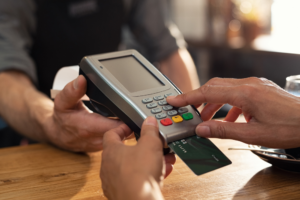
Card surcharges: Are you paying too much?
Ever wondered why your cup of coffee costs an extra 15 cents at one café and not another? Or why the service station advises that you will have to pay another 1.5 percent to use Visa or Mastercard?
It’s called a card surcharge - the amount a business charges to cover the cost of an electronic transaction, typically between 0.5 and 1.5 percent. While two-thirds of merchants absorbed this fee about five years ago, the use of debit and credit cards increased, and so has the number of businesses passing on the cost.
With the pandemic accelerating the use of debit and credit cards, chances are you’re being hit every time you shop - and possibly for much more than the business is entitled to charge you.
The Australian Competition and Consumer Commission (ACCC) introduced a ban on excessive surcharges in September 2016 to prevent profiteering, maintaining that businesses could only pass on the amount it cost them to make that transaction. But how do you even know the cost if the merchant isn’t upfront about the surcharge?
Let’s look closer at card payment surcharges and how you can reduce the hit to your hip pocket.
What is a card payment surcharge?
A card payment surcharge is the fee added to the cost of a product or service when you choose to pay by card - credit, debit or prepaid card - or other digital payment methods, such as Apple Pay.
It’s that extra bit you pay for the convenience of swiping or tapping your card instead of using cash. It's a cost that's built into our increasingly cashless society.

But here's where it gets a little tricky. Different cards incur different costs for the business. So you really don’t know how much extra you’re paying for.
For example, payments made using a regular debit card may cost less for the business to process than a premium credit card. So the surcharge for using the credit card might be higher.
The good news is merchants are not given free rein. The Reserve Bank of Australia (RBA) and the ACCC regulate these surcharges to ensure they're fair and not excessive. The average cost for different payment types, according to the ACCC, is:
-
- Eftpos: less than 0.5%
- Visa and Mastercard debit: between 0.5% and 1%
- Visa and Mastercard credit: between 1% and 1.5%
However, this ban does not apply to transactions using:
-
- BPAY
- PayPal
- Diners Club cards
- American Express cards issued directly by American Express
- Cash
- Cheques
Regardless of the payment type, the ban does not cover surcharges on taxi fares.
Do merchants have to charge a surcharge?
The RBA gave the merchants the right to impose a surcharge on card transactions, but they are not required to do so. The decision is entirely up to the business.
Those that do so implement card surcharges to offset the costs of processing card payments. This is usually true for small business owners whose profits from the items they sell are much lower.
Other businesses - usually the major retailers - may choose not to apply a surcharge. They might absorb the cost of card transactions as part of their operating expenses. This could be a strategic decision to stay competitive or keep customers happy.
But some merchants choose to integrate these costs into their product or service prices, effectively spreading the cost across all customers whether you pay with cash or card.
What merchants pass on surcharge costs to consumers?
While there are no hard and fast rules about which merchants will apply a surcharge, they are often the ones trying to offset the costs of accepting card payments. These can range from everyday businesses to utility companies and even government bodies.
If you're unsure whether a surcharge applies to a transaction, it's always a good idea to ask the retailer before paying.
Do I need to be warned about a surcharge before I pay?
The answer is a resounding "yes". Businesses are legally required to notify you about any surcharges applied to your transaction before you make a payment. This could be through a sign at the register, on the menu, on the website or even verbally by the staff. If you're shopping online, the website should display the surcharge information before finalising your transaction.
This requirement is part of the ACCC's regulations to ensure transaction transparency and fairness.
The surcharge rules for merchants
Fairness
At most, a business's surcharge must be the cost of processing the card payment. This means a company cannot profit from the surcharge; it can only use it to cover the costs of accepting card payments.
Transparency
Businesses must disclose any surcharges to you before you make the payment. This could be through signs at the register, website notifications or staff communication.
In cases where a business doesn't offer a surcharge-free payment option, meaning they don't accept cash and apply a surcharge to all types of card payments, the merchant must incorporate the minimum surcharge into the displayed price of its products.
What is a reasonable surcharge?
What constitutes a "reasonable" surcharge can vary depending on the type of card used for payment.
As a general guide, for payments made using debit cards like Eftpos, Visa or Mastercard, the typical costs to the merchant are between 0.5 percent and 1 percent of the transaction value. For credit cards, the costs are generally higher, typically between 1 percent and 1.5 percent for Visa and Mastercard.
Also, there are other types of surcharges. One is a flat fee surcharge. This is a fixed amount added to every transaction, regardless of the transaction size. For example, a business might add a 50-cent surcharge to all card transactions.
Then there’s a tiered surcharge. In this case, the surcharge varies depending on your transaction amount. For example, a business might charge a fee only for transactions less than $100.
Remember, these are general figures, and the actual costs can vary depending on a range of factors, including the merchant's size and industry and the specific terms of their agreement with their bank.
The cumulative impact of card surcharges
Consider a scenario where the average weekly expenditure on goods and services is $1,425. If a 1 percent surcharge is applied to this amount, the weekly surcharge would be $14.25.
Over the course of a year, these surcharges can significantly add up. Given there are 52 weeks in a year, the total annual surcharge would be $741. This is how much more you’ll pay due to the surcharge.
Even if only 33 percent of that amount is paid using a credit card, the surcharge will still be substantial: $244.40 for a year.
Add the average card fees - excluding interest rates - amounting to $94, and you’ll see the financial impact such additional payments can have over time, even if they appear small on a per-transaction basis.
Are there any tricks to look out for?
Besides the cumulative impact of surcharges, here are a few merchant "tricks" worth looking out for:
Excessive surcharges
As discussed earlier, Australian law stipulates that businesses can only charge a surcharge equivalent to the payment processing cost. However, some companies may attempt to impose excessive fees.
Surcharges not disclosed until checkout

Some businesses might only disclose the surcharge once you're at the point of payment. This can make their prices seem lower than they actually are. Make sure to ask about any potential surcharges before you make a purchase.
Uniform surcharges for different cards
Some merchants might charge the same surcharge for all card types, even though the cost of processing different types of cards can vary significantly. They are allowed to do this as long as the surcharge doesn't exceed the cost of the lowest-cost payment method.
Surcharges disguised as something else
In some cases, businesses might impose fees that are not explicitly labelled as surcharges but essentially serve the same function, that is, covering the costs associated with processing card payments. These disguised surcharges could take the form of handling fees, service fees or convenience fees. While the terminology differs, these fees still represent an additional charge imposed on customers who pay via card or specific payment methods.
In that case, the regulations around surcharges - including the ban on excessive surcharges - should apply.
How to minimise surcharges
No one likes paying extra fees, so here are some strategies you can use to minimise or avoid credit card surcharges:
Ask about surcharges
Before making a payment, ask the business if they apply a surcharge for your chosen payment method. If they do, consider using a different way that doesn't incur a surcharge or shopping at another business that doesn't apply a surcharge.
Use a different payment method
Businesses can only apply a surcharge that is equivalent to the cost of processing the payment. Therefore, using a cheaper payment method for the business, such as EFTPOS or debit card, could result in a lower surcharge or no surcharge at all. Square is another method that offers a low surcharge. Ask the merchant if they support Square.
Insert, don’t tap
If your card has EFTPOS on it, tell the cashier to insert your card instead of going for the tap-and-go option. This method supports the low-cost rating, saving you more on surcharge fees.
Shop around
Not all businesses apply surcharges, even if they accept credit card payments. If you're making a significant purchase, finding a business that doesn't apply a surcharge might be worth your time.
Negotiate the fee
In some cases, especially for larger purchases, you can negotiate the surcharge with the business. This might not always be successful, but it's worth a try.
Use cash

While it might not always be the most convenient option, paying with cash will ensure you avoid card surcharges.
Try POLi
This online payment option allows you to pay for goods or services directly from your bank account. It is a real-time bank transfer system supported by many Australian banks.
POLi payments do not typically carry a surcharge for consumers. But be aware that a POLi transaction with a credit card may be treated as a cash advance, which could incur additional fees from your card issuer.
How do I complain about a surcharge?
Don't just grumble quietly if you feel you've been overcharged; take action! If you believe you have been charged an excessive surcharge, here are some steps you can take:
- Speak up. The first thing to do is voice your concerns directly with the business. It may be an oversight on their part or a misunderstanding on yours. Discussing the issue could lead to a quick resolution.
- Gather evidence. If the business isn't helpful or refuses to change the surcharge, keep any receipts or other evidence of the transaction. Also, make a note of any surcharge warnings or signage displayed in the store or on the website.
- Contact your bank. If you've paid with a card, contact your bank or credit card provider. They might be able to provide advice or assist in resolving the issue.
- Report to the ACCC. If you're still not satisfied, you can report excessive payment surcharges to the competition regulator. The ACCC can investigate complaints and take action if it finds that a business is charging excessive surcharges.
Should you have any issues regarding a surcharge associated with BPAY, PayPal, Diners Club, or American Express, you can lodge a complaint with their respective system. If your concern pertains to a surcharge on a taxi fare, direct your complaint to the appropriate state or territory taxi industry regulator.
Remember, it's not just about getting your money back but about ensuring that businesses are held accountable and that other consumers don't get overcharged. Standing up for your rights can help bring about change and ensure a fairer marketplace for all.
Next time you go to pay for something, take a closer look at the information near the till, and if there is nothing to advise you about the cost of using a card, ask if you’re paying a surcharge. If you think it’s excessive and would like the business to be more transparent about this extra cost, lodge a complaint with us, and we’ll help you handle it.






